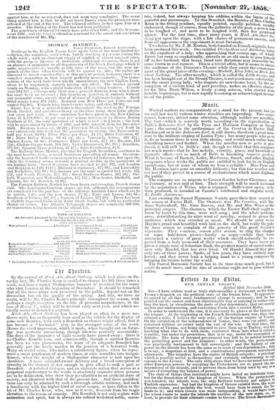64t fOratrr5.
By the revival of Much Ado About Yet/sing, which took place on Sa- turday last, Mr. Charles Kean is enabled to change his bill three times a week, and thus a varied Shaksperian banquet is provided for the many -who visit London at the beginning of December. It should be remarked that all the three plays now presented to the public, depend not on the decoration but on the quality of the acting. And this, we have no doubt, will be Mr. Charles Kean's principle throughout the season, with perhaps a single exception on the side of pictorial magnificence, in the case of Henry V., which will be revived early next year, and which na- turally seems to demand a pageant.
ifteeli Ado About Nothing has been played so often in a mere me- diocre style, has so frequently been used as the vehicle for the display of some new Beatrice, with such a Benedick as chance might afford, that it has become a " hacknied" play in the strongest sense of the word. Hence the vivid impression, which it made, when brought out on Satur- day was perfectly astonishing, though likewise perfectly accountable. The days of the magnates of light comedy have passed away ; there is no Charles limbic now, and consequently, though a spirited Beatrice has been no rare phenomena, the want of an adequate Benedick has generally put the lively maiden in the position of a bereaved truth. Many an useful actor, who makes a satisfactory figure, when he repre- sents a smart gentleman of modern times, at once crumbles into insigni- ficance, when the weight of a Shaksperian character is laid upon his shoulders. A more straightforward delivery and a broad conception of vivacity in the abstract is not enough to give effect to such a part as Benedick. A polished dialogue, and an elaborate action that serves as a perpetual commentary to the words is absolutely requisite when persons are to be delineated, who show their peculiarities in an artificial state of society, not identical with that of the present day. And those qualifica- tions can only be attained by such a thorough artistic training, and such a familiarity with the higher kind of social usages, as have fallen to the lot of Mr. Charles Kean, who, now as it were, descends from his tragic elevation to the rescue of comedy. His Benedick is not only replete with anfination and spirit, but is always the refined well-bred noble, emu. trio, indeed, but always keeping his oddities within the limita ef• the graceful and picturesque. To this Benedick, the Beatrice of Mrs. Clunks Kean is the fitting pendant, equally pointed, equally polished, equally elaborated, though of course, from the gallantry of the poet, a person len to be laughed at, and more to be laughed with, than her perplexed adorer. For the first time, since many years, is Mad Ado about V • t7thig. put upoa the stage, with a fair chance of permanent succeas, and from all appearances the experiment is Most fortunate. Two farces by Mr. J. M. Morton, both founded on French originals, have been produced this week. One entitled Th irty-th Tee next Bii•thelay, turns on the expedient of a lady, who approaching that certain age, of which - Byron has sung so emphatically, prevails on an old uncle to pass himself off as her husband, that beaux lured into flirtations may insensibly be- come lovers in real earnest. This is a trivial affair, but it seems to amuse the audience of the Princess's Theatre while they await the commence- ment of the grand piece of the evening—lfaebeth, King John, or Meth Ado about Nothing. The other novelty, which is called the Little Savage, and has been brought out at the Strand Theatre, is not much more substantial; but the smart young lady, who disgusts an unwelcome lover, by the as. suruption of a violent kind of pert puerility, makes an effective charac- ter for Miss Mario Wilton, a lively young actress, who started from humble beginnings, but is now rapidly becoming an aelmowlosiged favour- ite of the public.


























 Previous page
Previous page